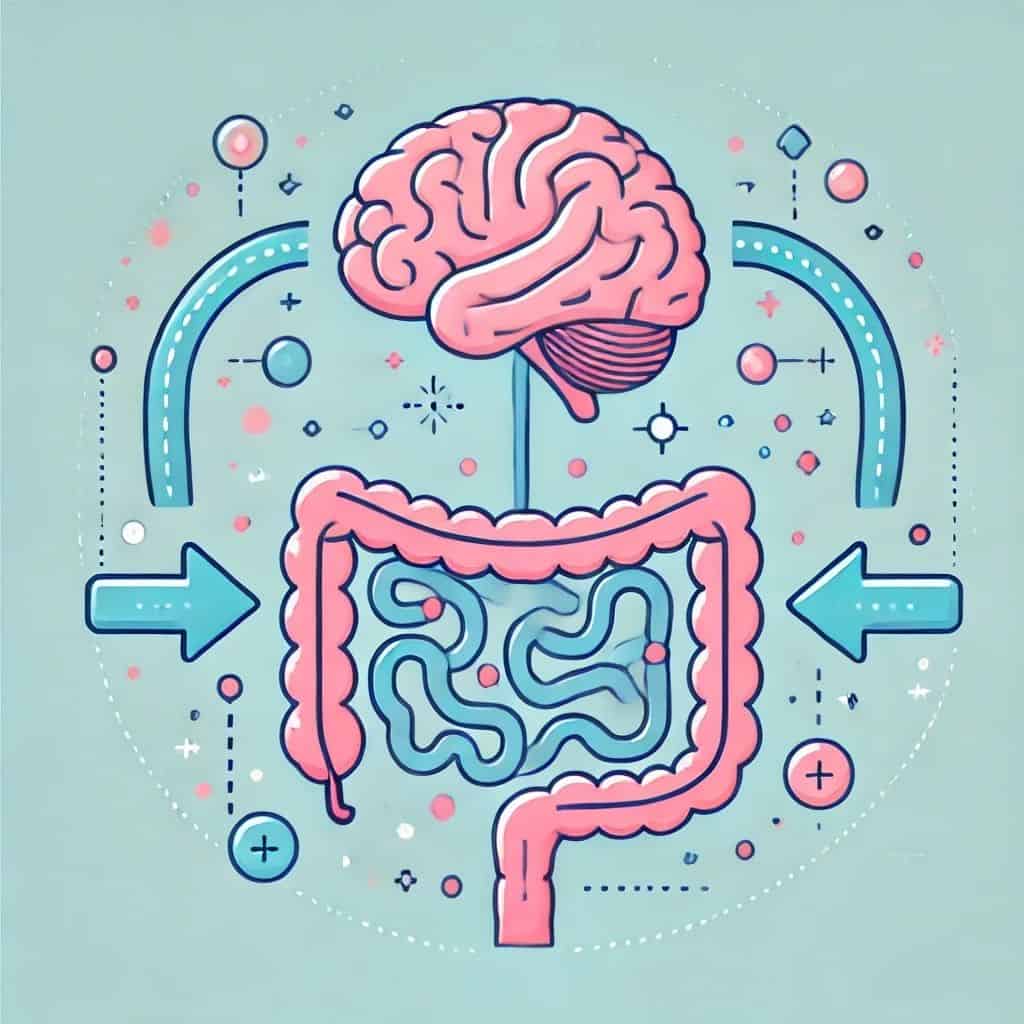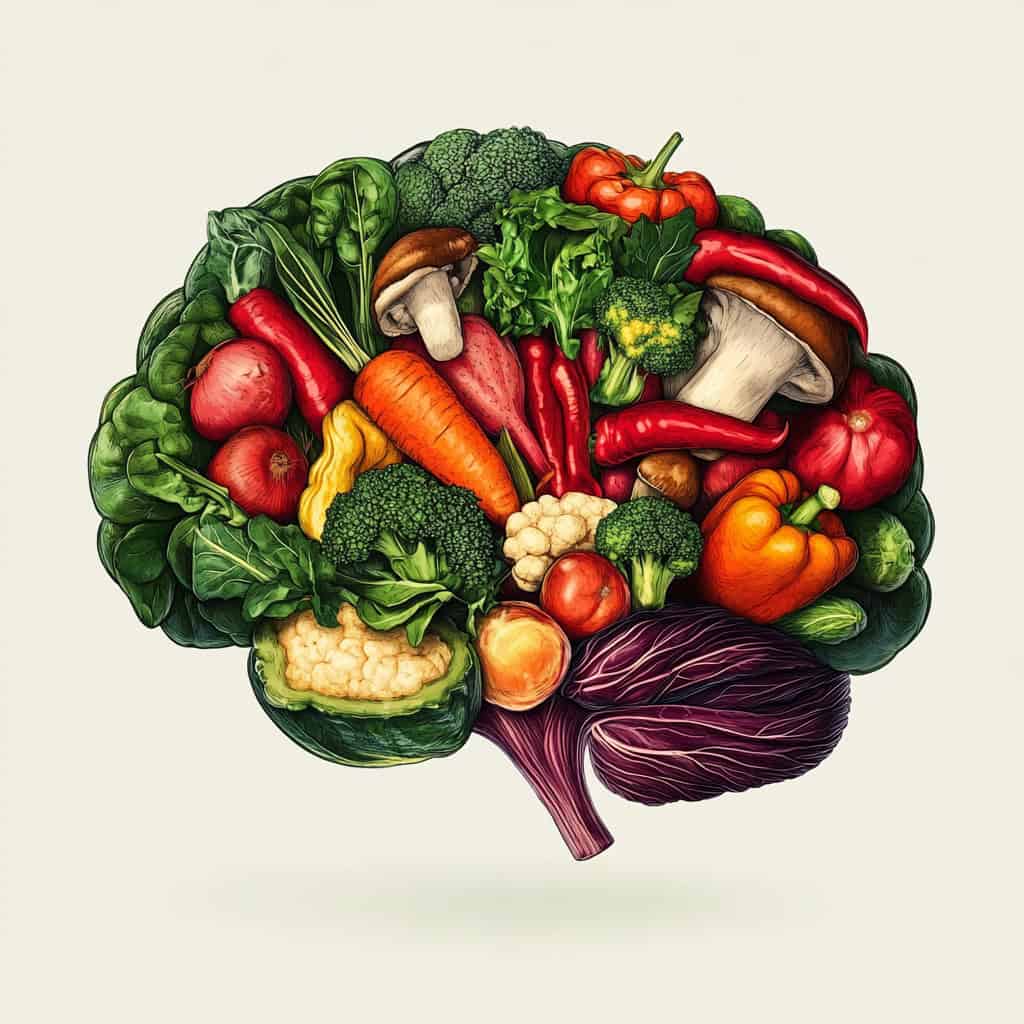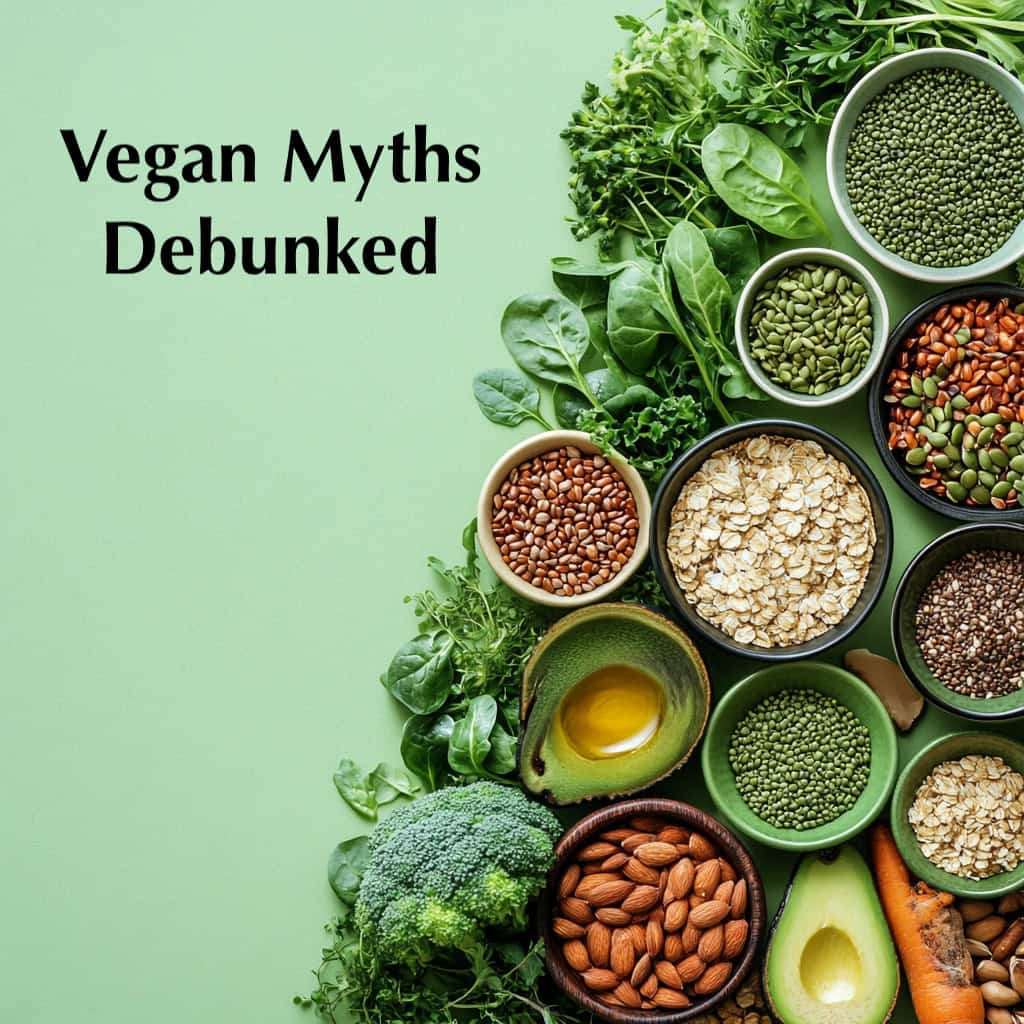
Jump To:
- How Nutrition Affects Mental Health
- The Link Between Veganism and Mental Health
- Key Nutrients for Mental Health Abundant in a Vegan Diet
- Veganism and Depression: Is There a Connection?
- Challenges and Solutions for a Healthy Vegan Mental Health Approach
- Myths vs. Facts: Debunking Common Misconceptions
- Final Thoughts: Veganism Supports Positive Mental Well-Being
The food we eat plays a major role in how we feel—not just physically but mentally as well. Research has shown that diet and mental health are deeply connected, influencing everything from mood and energy levels to cognitive function and stress management.
As veganism grows in popularity, many people are asking: How does a vegan diet affect mental health?
Some studies suggest that a well-balanced vegan diet may support better mood stability and cognitive function. However, concerns around nutrient deficiencies, particularly with vitamin B12, omega-3s, and iron, have sparked debate about whether a vegan diet can fully support mental well-being.
Learn how super greens can help prevent deficiencies in a vegan diet
In this article, we’ll explore the relationship between veganism and mental health, breaking down the science, key nutrients, and practical ways to optimize a plant-based diet for emotional and cognitive well-being.
How Nutrition Affects Mental Health

Our diet doesn’t just fuel our bodies—it directly impacts our brain function, mood, and emotional well-being. The nutrients we consume play a vital role in neurotransmitter production, inflammation regulation, and gut health, all of which influence mental health.
By understanding how nutrition affects mental health, we can make informed dietary choices that support cognitive function, emotional balance, and overall well-being.
The Gut-Brain Connection
The gut and brain are closely linked through what’s known as the gut-brain axis—a network of nerves, neurotransmitters, and microbiota that influence mood, stress levels, and cognition. A healthy gut microbiome helps regulate serotonin production, often referred to as the “happiness hormone.”
This is why gut health is crucial for mental well-being, and diet plays a significant role in maintaining a balanced microbiome. A diet rich in fiber, antioxidants, and probiotics—common in plant-based eating—can help support gut health, reducing symptoms of anxiety and depression.
Try This: Incorporating a high-quality greens powder like Live it Up Super Greens can provide essential gut-supporting nutrients and probiotics, ensuring better digestion and improved mood stability
Key Nutrients for Mental Health
Certain vitamins and minerals are especially important for brain function and emotional stability, including:
- Omega-3 Fatty Acids: Essential for brain function
- Vitamin B12: Energy and mood regulation
- Iron & Zinc: Cognitive and emotional balance
- Amino Acids & Protein: The building blocks of neurotransmitters
Ensuring you get enough of these nutrients is crucial for optimal mental well-being.
How Deficiencies Impact Mental Health
When key nutrients are missing from your diet, mental health can suffer. Some common symptoms of nutrient deficiencies include:
- Low Omega-3s → Brain fog, anxiety, poor memory
- B12 Deficiency → Fatigue, mood swings, cognitive decline
- Iron/Zinc Deficiency → Low energy, difficulty concentrating, irritability
- Lack of Protein → Reduced serotonin and dopamine production, leading to mood instability
The solution is a well-balanced plant-based diet, combined with the right supplements. This can ensure you get the nutrients needed for a healthy mind.
The Link Between Veganism and Mental Health

The relationship between diet and mental health is well-documented, and a growing body of research suggests that a well-planned vegan diet may offer several mental health benefits.
Plant-based diets are naturally rich in antioxidants, fiber, and essential nutrients that support brain function and emotional stability. Additionally, reducing the intake of processed foods and inflammatory animal products may contribute to improved mood and cognitive function.
However, transitioning to a vegan lifestyle also raises concerns regarding potential nutrient deficiencies, particularly in B12, iron, and omega-3s—nutrients critical for brain health. Understanding both the benefits and challenges of a plant-based diet is key to optimizing mental well-being.
Potential Mental Health Benefits of a Vegan Diet
- Improved Mood and Emotional Balance – A diet rich in plant-based foods provides essential vitamins, minerals, and amino acids that support neurotransmitter function, leading to better mood stability and reduced stress levels.
- Reduced Inflammation – Plant-based diets are naturally anti-inflammatory, which may protect against mental health conditions such as depression and anxiety.
- Better Gut Health – High-fiber plant foods promote a balanced gut microbiome, which plays a crucial role in serotonin production and overall mental well-being.
- Stable Blood Sugar Levels – A diet centered around whole plant foods can help prevent energy crashes and vegan diet mood swings, keeping cognitive function sharp throughout the day.
Common Concerns About Veganism and Mental Health
- Risk of Nutrient Deficiencies – Without proper planning, a vegan diet can lack key nutrients like B12, iron, omega-3s, and zinc, which are vital for brain function.
- Cognitive Fog and Fatigue – Some individuals report low energy or difficulty concentrating when switching to a plant-based diet, often due to inadequate protein or nutrient intake.
- Individual Variability – While many thrive on a vegan diet, others may find it challenging to meet their mental health and energy needs without careful supplementation.
A well-balanced vegan diet has the potential to enhance mental health, stabilize mood, and improve cognitive function, but it must be planned carefully to avoid nutrient deficiencies.
By incorporating a variety of plant-based whole foods and key supplements, individuals can enjoy the mental health benefits of veganism while maintaining optimal brain function and emotional well-being.
Key Nutrients for Mental Health Abundant in a Vegan Diet

Certain nutrients play a crucial role in mood regulation, cognitive function, and emotional stability. Without them, individuals may experience brain fog, fatigue, mood swings, or even symptoms of depression and anxiety.
Let’s break down the most important nutrients for a plant-based diet and mental health.
1. Omega-3 Fatty Acids: Essential for Brain Function
Omega-3s are critical for brain health, playing a key role in cognitive function, mood regulation, and inflammation control. A deficiency in these essential fatty acids has been linked to increased anxiety, depression, and memory issues.
Best Vegan Sources
- Flaxseeds
- Chia seeds
- Walnuts
- Hemp seeds
- Algae-based omega-3 supplements (best for DHA & EPA)
Pro Tip: Since most plant-based omega-3 sources contain ALA (which converts inefficiently to DHA/EPA), an algae-based supplement is highly recommended for optimal brain support.
2. Vitamin B12: Energy and Mood Stability
Vitamin B12 plays a vital role in energy production, neurotransmitter function, and brain health. A deficiency can lead to fatigue, brain fog, and an increased risk of depression.
Best Vegan Sources
- Fortified plant-based milks
- Nutritional yeast
- Fortified cereals
- B12 supplements (recommended for all vegans)
Pro Tip: Since B12 is not naturally found in plant foods, supplementation is crucial to avoid deficiencies and support long-term mental well-being.
3. Iron & Zinc: Cognitive and Emotional Balance
Iron helps transport oxygen to the brain, supporting mental clarity and focus. Zinc plays a role in neurotransmitter function and stress management. Deficiencies in either nutrient can cause low energy, brain fog, and irritability.
Best Vegan Sources
- Lentils
- Chickpeas
- Tofu & tempeh
- Quinoa
- Pumpkin seeds & sesame seeds
Pro Tip: Iron from plant sources is non-heme iron, meaning it is less easily absorbed. Pairing iron-rich foods with vitamin C (citrus fruits, bell peppers, tomatoes) can significantly enhance absorption.
4. Amino Acids & Protein: The Building Blocks of Neurotransmitters
Protein provides amino acids like tryptophan, which are essential for producing serotonin and dopamine—the neurotransmitters responsible for happiness, motivation, and mood stability. Inadequate protein intake can contribute to low energy, irritability, and mental fatigue.
Best Vegan Sources
- Lentils & beans
- Tofu & tempeh
- Quinoa
- Nuts & seeds
- Spirulina
Pro Tip: Combining different plant proteins throughout the day ensures you get a full spectrum of essential amino acids for optimal brain function.
A nutrient-dense vegan diet can fully support mental well-being when properly planned. By focusing on vegan omega-3 sources for brain health, B12, iron, zinc, and high-quality protein sources, plant-based eaters can optimize cognitive function, stabilize mood, and reduce the risk of mental fatigue.
Veganism and Depression: Is There a Connection?

Some studies suggest that a plant-based diet may reduce symptoms of depression thanks to its anti-inflammatory effects and high nutrient density.
However, other research points to increased depression rates among vegans who lack proper nutrition—highlighting the importance of adequate B12, iron, and omega-3 intake.
Lifestyle Factors that Impact Mental Health
While nutrition plays a crucial role in supporting mental health, diet alone isn’t the full picture. Mental well-being is influenced by multiple lifestyle factors, including physical activity, stress management, sleep quality, and social connections.
These elements work together to regulate mood, enhance cognitive function, and build emotional resilience.
The best vegan foods for mental clarity require incorporating healthy habits alongside a balanced plant-based diet.
Here are some key lifestyle factors to consider:
- Exercise: Physical activity increases serotonin and dopamine production.
- Mindfulness & Stress Reduction: Meditation and relaxation techniques improve mental clarity.
- Social Connections: Having a strong support network plays a major role in emotional well-being.
Focusing on nutrition, movement, rest, and meaningful connections creates a well-rounded foundation for mental health.
A plant-based diet rich in essential nutrients can provide the fuel your brain needs, while exercise, mindfulness, and strong relationships support emotional balance and resilience.
Challenges and Solutions for a Healthy Vegan Mental Health Approach
A well-balanced vegan diet can provide all the essential nutrients for optimal brain function and emotional stability, but it requires careful planning to prevent deficiencies.
The good news? These challenges are easily manageable with the right meal planning, supplementation, and nutrient-dense foods.
Let’s explore practical solutions to help you thrive on a plant-based diet.
| Nutrient | Why It’s Important | Best Vegan Sources | Supplementation Needed? |
|---|---|---|---|
| Vitamin B12 | Supports brain function, energy, and mood | - Fortified plant milks - Nutritional yeast | Yes - B12 supplements are typical for vegans |
| Omega-3s (DHA/EPA) | Improves cognitive function and reduces inflammation | - Flaxseeds - Chia seeds - Walnuts - Hemp seeds | Yes - Algae-based omega-3s recommended |
| Iron | Helps oxygen transport and prevents fatigue | - Lentils - Tofu - Quinoa - Spinach | Maybe - If experiencing fatigue, consider a plant-based iron supplement |
| Zinc | Supports neurotransmitters and immune function | - Pumpkin seeds - Chickpeas - Cashews | Maybe - Can be harder to absorb from plant foods |
| Amino Acids (Protein) | Builds neurotransmitters like serotonin and dopamine | - Legumes - Tofu - Tempeh - Nuts - Seeds | No - Can be met through a diverse plant-based diet |
Pro Tip: To boost iron absorption, pair iron-rich foods with vitamin C sources like bell peppers, citrus fruits, and tomatoes.
Meal Planning Tips for Optimal Mental Wellness
Eating a well-balanced vegan diet doesn’t have to be complicated, but it does require thoughtful planning to ensure you’re meeting your brain’s nutritional needs.
Here are some practical meal-planning tips to help you stay on track:
- Plan Balanced Meals: Make sure your meals include a mix of whole grains, legumes, vegetables, and healthy fats to support brain health.
- Prioritize Protein Intake: Since amino acids are essential for mood-regulating neurotransmitters, include tofu, tempeh, lentils, and quinoa in your daily diet.
- Add Brain-Boosting Fats: Incorporate avocados, nuts, and seeds for healthy fats that support mental clarity and emotional stability.
- Don’t Forget Fermented Foods: Support your gut-brain connection by consuming kimchi, sauerkraut, miso, and probiotic-rich foods for a balanced microbiome and improved mood regulation.
- Use Supplements When Needed: A B12 supplement and algae-based omega-3s are key to avoiding deficiencies that could impact mental wellness.
With a little preparation and the right food choices, you can easily create a plant-based meal plan that fuels both your body and mind.
The Role of Greens Powders in Supporting Vegan Nutrition
Even with the best meal planning, it can be challenging to get all essential nutrients every day. That’s where greens powders come in!
A high-quality greens supplement can fill nutritional gaps, supporting brain health, gut function, and overall well-being.
Key Benefits of a Greens Powder
- Provides essential vitamins and minerals for mental clarity
- Contains probiotics and digestive enzymes for a healthy gut-brain connection
- Supports immune function and energy levels
- Convenient and easy to add to daily routines
There are a variety of great powders and options available to try. But, if you’re looking for a reliable, high-quality greens powder, our top pick is Live it Up Super Greens.
Why Live it Up?
- Made with organic vegetables for clean, high-quality nutrition
- No stevia, artificial sweeteners, or fillers
- Includes probiotics & digestive enzymes for gut health
- Best-tasting greens powder—independently rated by Verywell Health
Try Live it Up Super Greens today!
Myths vs. Facts: Debunking Common Misconceptions

When it comes to veganism and mental health, misinformation is everywhere. Let’s break down some of the most common myths and uncover the truth behind plant-based nutrition and brain health.
Myth #1: "Vegans are more likely to be depressed."
Fact: There is no conclusive evidence that vegans experience higher rates of depression than omnivores. While some studies suggest that individuals following plant-based diets report lower mood scores, this is often linked to nutrient deficiencies rather than the diet itself.
When properly planned, a vegan diet can provide all the nutrients necessary to support mental well-being. Key nutrients like B12, omega-3s, iron, and zinc must be prioritized to ensure optimal cognitive function and emotional balance.
Myth #2: "A vegan diet lacks essential brain-boosting nutrients."
Fact: When it comes to a vegan diet and mental health, it’s worth knowing that a plant-based diet can supply all the critical nutrients when well-planned. Many nutrient-dense vegan foods support brain function, mood regulation, and cognitive clarity.
Flaxseeds, walnuts, and algae-based omega-3s provide essential fatty acids, while lentils, quinoa, and dark leafy greens offer iron and amino acids needed for neurotransmitter production. Supplementation with B12 and omega-3s is recommended for optimal mental wellness.
Myth #3: "Animal-based foods are necessary for mental health."
Fact: While animal products contain certain brain-supporting nutrients like B12 and DHA, these nutrients are not exclusive to animal sources. Vegan-friendly alternatives such as fortified plant milks, nutritional yeast, algae-based omega-3 supplements, and high-protein plant foods can fully meet mental health needs.
A properly balanced plant-based diet, combined with the right supplements, can support brain function and emotional well-being just as effectively as an omnivorous diet.
Final Thoughts: Veganism Supports Positive Mental Well-Being
So, how does nutrition affect mental health? The connection between nutrition and mental health is undeniable, and a well-balanced vegan diet can fully support brain function, mood stability, and emotional well-being when properly planned.
Ensuring adequate intake of omega-3s, B12, iron, zinc, and plant-based protein is essential to prevent deficiencies that could impact cognitive function. In addition to nutrition, regular exercise, stress management, and quality sleep play key roles in maintaining mental wellness.
For those looking to optimize their plant-based diet, strategic supplementation can help bridge nutrient gaps. A high-quality greens powder like Live it Up Super Greens provides essential vitamins, minerals, and digestive support for overall well-being.
Small, intentional dietary changes can have a significant impact on mental health, making it easier to feel energized, focused, and emotionally balanced on a vegan diet.
The V Nutrition Editorial Team, consisting of experts in vegan nutrition and health, focuses on providing accurate and helpful information. With backgrounds in nutrition science and a shared commitment to plant-based living, we ensure that every piece of content not only educates but also empowers our readers to make informed lifestyle choices.
The V Nutrition Editorial Team, consisting of experts in vegan nutrition and health, focuses on providing accurate and helpful information. With backgrounds in nutrition science and a shared commitment to plant-based living, we ensure that every piece of content not only educates but also empowers our readers to make informed lifestyle choices.




Comments
No Comments